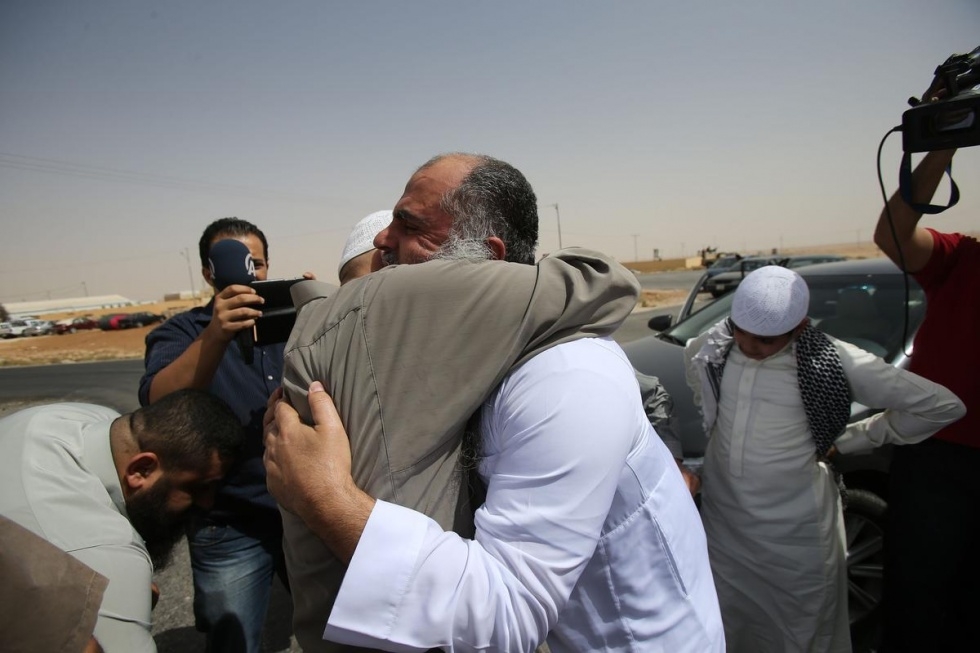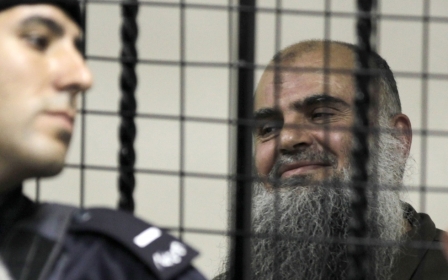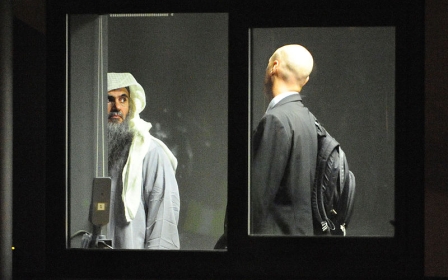When the truth's held captive: Omar Othman’s release and Britain’s shame

In the last few days, English language media responses to the Jordanian court’s release of Omar Othman, or Abu Qatada, have largely blurred the historic importance of the judicial ruling, either by a focus on the convenience to Jordan of his public condemnation of ISIS, or with the angle that he will, in any event, be unable ever to return to the UK.
Mr. Othman, a widely respected scholar and cleric, was not released to help a Jordanian government in difficulties over its Syrian war policy and with the various strands of Islamist opposition in the country. Nor is any possible return to the UK of the slightest relevance to the Othman family.
The primary point is that Mr. Othman was found innocent in court of all charges - he is not a terrorist, as the UK government repeatedly accused over many years. And the outcome of the case puts a spotlight on successive UK governments’ inept handling of terror related issues at home and abroad in the post 9/11 years. At this critical moment in the Middle East, when the UK has just entered a war which it can no more win than it could the so-called “war on terror,” this case underlines a key piece of the recent history of errors and hypocrisy of the British intelligence services and the political class. The role of the media in creating myths useful to the British state is also part of the scenario both past and present. Our democracy is all the worse for it.
Mr. Othman suffered more than a decade of character assassination from the most senior political figures in the UK, who were bent on deporting him to Jordan to face terrorism charges. He, like many others from the Middle East, had been accepted as a refugee in the UK in the pre-9/11 atmosphere, when the UK gave a home and security to those who were fleeing despots and torturers. When he was convicted of terrorism in Jordan in 2000 in absentia, the Jordanian government did not ask for his extradition.
But post-9/11 in Britain, he was made into a mythical figure, symbolising the sinister Muslim par excellence. The British SIAC court, which allows secret evidence, called him a “truly dangerous individual.” The Spanish judge, Balthazar Garzon (known for his role in the attempted European trial of Chile’s dictator, General Pinochet) called him “Osama Bin Laden’s right hand man,” and “Al-Qaeda’s European ambassador.” Two UK residents, Bisher al-Rawi and Jamil al-Banna, friends and acquaintances of Mr. Othman, were arrested on a business trip in Gambia and suffered life-changing torture and years of prison in Bagram and Guantanamo Bay, where they had hundreds of hours of interrogation about Mr. Othman. They were only released after determined litigation threatened serious embarrassment to the UK. The government finally had to pay them compensation rather than experience a court case that would have exposed UK officials’ complicity in extraordinary rendition and the horror of Guantanamo.
Throughout these years, Mr. Othman was imprisoned in the UK without trial, or held under house arrest when his lawyers managed to get him out of prison, twice, for a few months. His family, including his children, were the victims of open hostility and harassment of every sort by the most ignorant members of our society and the media. It was a campaign of public insult that showed the ugly Islamophobic prejudice and racism of a sizable part of British society. As an illustration, one MP in 2012 introduced a bill for the UK to leave the European Court of Human Rights just so that Abu Qatada could be deported.
Bob Quick, former head of counter-terrorism at Scotland Yard gave the official line to the BBC, "I would describe Abu Qatada as very dangerous, a man with significant influence …. with very extreme views, and prepared to promulgate those views and influence the views of others and their conduct...He was an active supporter of terrorism and extreme Islamist objectives through terrorism.”
However, during all his years in a UK prison, Mr. Othman was never charged with any offence or heard from, except when he came to the aid of the authorities by making public appeals for the lives and release of two British men held as hostages - Norman Kember in Iraq and Alan Johnston in Gaza. Despite him being considered influential enough to be used for that purpose, British officials made no attempt to discuss with him the ferment in the Arab world, or the sharp criticism of British foreign policy that so profoundly marked, in particular, young British Muslims, by whom he was much admired.
His prestige within the Muslim community in Britain and far wider afield as a respected scholar and a dignified authority figure grew in parallel with his demonization by the UK authorities. The public attempts to humiliate him failed, even his prison guards treated him respectfully. And when he decided to leave the UK with his family, it was because Jordan had changed the law so evidence obtained from torture could not be used in his trial. Lawyers familiar with his case never expected any result other than acquittal.
In the deepening Middle East ferment, where US and UK foreign policy in Iraq and Syria has what the authoritative commentator, Patrick Cockburn called an Alice in Wonderland absurdity, the opinions and influence of Mr. Othman have weight. The UK missed a great chance to understand the future Middle East from his point of view. If only the British had taken their opportunity to talk to him and know him over all those years, they might have had a more sophisticated view of what the current new US and UK bombing will bring the region. Then it might not be just former Foreign Office officials, like ambassador Oliver Miles, who spell out what UK policy should be.
Tony Blair and a band of politicians with no historical sense of what such utter destruction of societies would mean for the entire region of the Middle East took Britain into war after war alongside the US. The fallout has corroded our own society too. David Cameron’s government today shows the same mixture of political ignorance and self-deception, as Patrick Cockburn has memorably put it. If any of them had more interest in history, they might reflect on how for decades British colonial officials got it all wrong - they tortured and locked up “terrorists” who they later had to recognise as key leaders. The name of Omar Othman, or Abu Qatada, will be remembered long after those of the many British politicians who locked him up and insulted him and his family.
Vittoria Brittain worked at The Guardian for many years and has lived and worked in Washington, Saigon, Algiers, Nairobi, and reported from many African, Asian and Middle Eastern countries. She is the author of a number of books on Africa and was co-author of Moazzam Begg's Guantanamo memoir, Enemy Combatant, author and co-author of two Guantanamo verbatim plays, and most recently of Shadow Lives, the forgotten women of the war on terror. She is on the board of the Institute of Race Relations, a patron of palestine Solidarity, and co-founder of Action for Palestinian Children.
The views expressed in this article belong to the author and do not necessarily reflect the editorial policy of Middle East Eye.
Photo: Omar Othman/Abu Qatada feels joyful moments with his family members after being released from prison after being found not guilty of terrorism charges by Jordanian court in Amman, Jordan on 24 September
Middle East Eye propose une couverture et une analyse indépendantes et incomparables du Moyen-Orient, de l’Afrique du Nord et d’autres régions du monde. Pour en savoir plus sur la reprise de ce contenu et les frais qui s’appliquent, veuillez remplir ce formulaire [en anglais]. Pour en savoir plus sur MEE, cliquez ici [en anglais].





